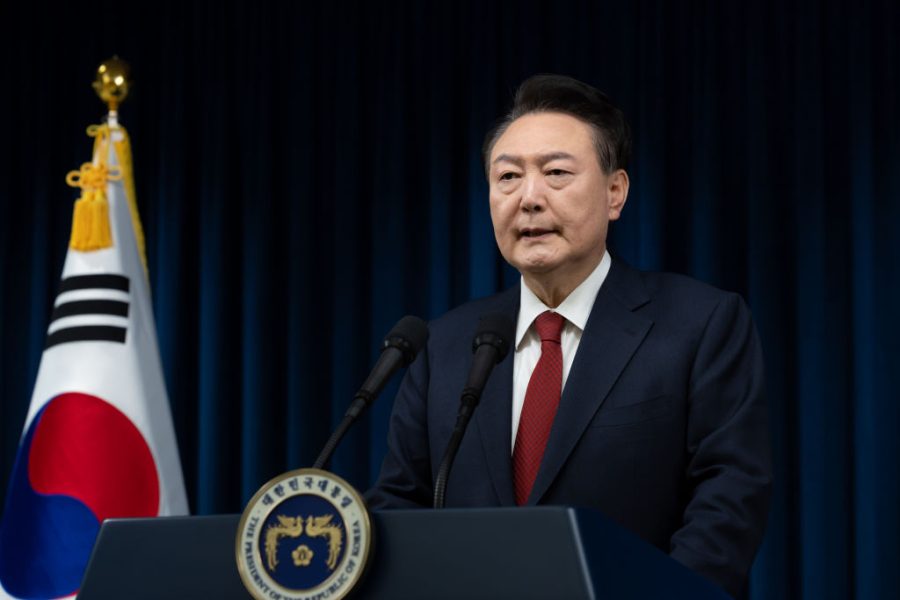This year has commenced in an historic fashion for South Korea – albeit for all the wrong reasons. Earlier today, South Korean authorities arrested the suspended – but still sitting – president, Yoon Suk Yeol, on charges of corruption and inciting insurrection, after several weeks of the embattled leader evading this outcome. Today marks the first time in history that a sitting South Korean president had been arrested, plunging South Korea once again into unchartered waters. Domestic politics in Asia’s fourth-largest economy looks like it will only get messier.
It has been a tempestuous month in South Korean politics. For all the personal scandals, skulduggery, and schisms within his party (the People Power party), Yoon Suk Yeol’s presidency will forever be stained with his short-lived declaration and retraction of martial law on 3 December. Deploying the nuclear option in domestic politics, Yoon’s justification – namely to protect South Korea from ‘anti-state’ and ‘pro-North Korean’ forces – plunged the country into confusion. The subsequent weeks saw the land of the morning calm become anything but, as pro- and anti-Yoon constituencies clashed, the latter of which remained intent on doing everything in its power to destroy the president and the ruling conservative party.
This morning’s actions seemed closer to a video game than reality
The story did not end with the president’s suspension two weeks after that ill-fated declaration. In another first for South Korean political history, acting president and former prime minister, Han Duck-soo, would rule for a term that would make former British prime minister Liz Truss seem a long-serving leader. Lasting only thirteen days, and ending on 27 December, Han would also face impeachment on account of delaying Yoon’s impeachment and being complicit in the initial martial law fiasco. The reins of power now rest with the former finance minister, Choi Sang-mok.
Yoon’s arrest, which happened even before the dawn chorus began, carries more than a hint of irony. This is a man who is no stranger to the rule of law, and who rose to the heights of presidential leadership having served as prosecutor-general. He played a key role in indicting past presidents, Park Geun-hye – the last South Korean leader to face impeachment in 2016 – and Lee Myung-bak for abuse of power. Park and Lee served time in jail – a fate which potentially awaits Yoon – but would later be pardoned by Yoon during his time as president. The very office that was created at the end of Yoon’s tenure as prosecutor-general, the Corruption Investigation Office for High-ranking Officials, has now turned against him. Having failed to arrest Yoon on 3 January after a six-hour standoff with his security detail, another multiple-hour confrontation earlier today proved successful.
This morning’s actions seemed closer to a video game than reality, as riot police, investigators, and detectives became hellbent on ensuring it was second time lucky. Hiking trails were used, barricades scaled and barbed wire sliced, all in the name of accessing the presidential residence and arresting the President.
It had been a long time coming. The first hearing of his impeachment trial, held only yesterday by the constitutional court, lasted a mere four minutes owing to Yoon’s absence. The next hearing is scheduled for tomorrow. Today’s events may catalyse a faster resolution to the 180-day timeframe for the court to decide whether to oust the beleaguered leader.
Although the likelihood of Yoon’s return to power seems slim, the man whose approval ratings reached a nadir of 11 per cent in early December is experiencing an uptick in popularity. His current approval ratings sit at just over 40 per cent. The declaration of martial law was disastrous, dangerous, and frankly ridiculous for an already-unpopular president. Yet, as anger and frustration engulf South Koreans on the left and right – albeit for different reasons – we should be anything but surprised if Yoon’s approval ratings creep upwards, as his supporters rally against his disbelievers.
Hours prior to his arrest, Yoon decried the ‘illegality’ of the investigation into insurrection charges, a view that his detractors obviously refute. Citing the need to restore ‘democracy and the rule of law’ – variants of which Yoon himself used when declaring martial law – the main opposition party, the leftist Democratic party, has now got their way in hastening the downfall of a man whom they have never liked. But this is the pot calling the kettle black. Corruption has long-engulfed South Korean politics of all colours. The opposition, not least their leader, Lee Jae-myung, has anything but a spotless record.
Though a truism, rule of law and democracy are indeed essential to any democratic state. But South Korea cannot allow domestic political divisions to overwhelm its need to respond to an increasingly threatening regional and global environment. North Korea is showing no intention of calming down; the same can be said of China’s economic and political coercion. With less than a week before Donald Trump’s inauguration as the 47th president of the United States, Seoul’s concerns for what the next four years will bring continue, not least whether the ‘very wealthy’ country will be asked to pay more for stationing US troops on the peninsula – although the likelihood of their withdrawal remains low – or whether tariffs will be imposed on US imports.
As South Koreans wait to witness the fate of their president, one thing can be said with greater certainty. Polarised domestic politics means weaker leverage internationally, and only plays into the hands of adversaries to exploit the mayhem for their own advantage. And for us in Great Britain, this is something which we must not forget.







Comments